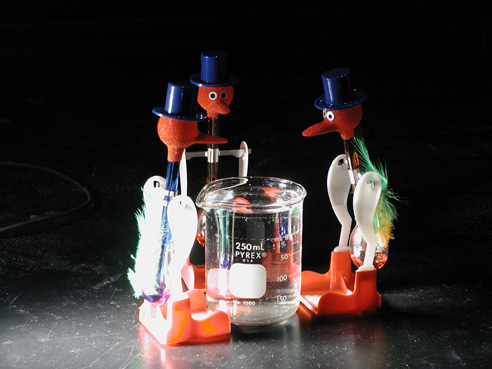The economy is not a dippy duck
Politicians make pious noises about governments “living within their budgets.” According to them, this is how “families” do it.

Intelligent economists — Martin Wolf and Krugman to take just two — are rightly incensed at that self-serving nonsense (whose real point is to prevent tax hikes on the wealthy, but that’s a ‘nother whole mess).
Unfortunately, they don’t provide an easy way to visualize the difference between citizen and government finances. Krugman, for instance, otherwise one of the best examples of lucidity, uses the analogy of a babysitters club. It’s a fine analogy. There’s nothing wrong with it on the merits. But if it means something to you, you already understand the economy and you don’t need it. The rest of us could use something simpler and more visual.
Acid Test to the rescue.
Individuals get money from somewhere and spend it elsewhere. The path can only go in one direction. If the source of money dries up, there is no way to magically make more appear.
An economy, however, is millions of people. (Except when countries are smaller, but you know what I mean.) Each little unidirectional flow adds together into an enormous wheel, like a water wheel.

for a single board in the wheel.
It is not linear. It is not unidirectional. It is not like a dippy duck, whose beaker can’t turn over and reappear filled. It is like a wheel.
In a whole economy, the flow on the individual parts makes the whole thing turn. The wealth — or the water — does need some added external input such as a stream or farmers making something out of sunlight and land. Once that stream enters the system, whether it’s made of water or money, the wheel can turn and multiply the benefits.
If you turn off the supply of water on the wheel, the whole thing stops. When it happens in the economy, it’s called a Depression and it means less money everywhere on the wheel. For an individual, cutting back spending to match income leads to wealth. For an economy, if it’s grinding to a halt, reducing spending equals losing money. The slower the wheel turns, the less money there is to be had. Everybody gets poorer, not richer. That is not what solving the problem looks like. That is what stupidity looks like.
That’s why, if people have no money to spend, it makes sense for the government to spend. The wheel needs to be kept turning. Otherwise poverty feeds on itself.
(And, yes, if the economy is humming with minimal government help, then keep it minimal. Developed world economies are not, you’ve probably noticed, humming.)
The government can’t just spend without any regard to the wealth of the economy. But that’s not the same as declaring wealth off-limits and then driving the economy down to a trickle because “spending is bad.”
What’s bad is waste and poverty. What’s bad is grinding the whole wheel to a halt because you can’t see the difference between a straight line and a circle.


